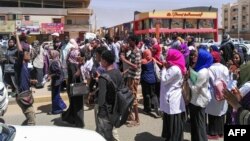Hundreds of protesters, mostly students, took to the streets in and near Sudan's capital, Khartoum, on Monday, continuing a three-month wave of demonstrations that has posed the most serious challenge yet to President Omar al-Bashir's three-decade rule.
Students, activists and other protesters frustrated with economic hardships have held almost daily demonstrations across Sudan since Dec. 19, calling for Bashir to step down.
Police used tear gas Monday to disperse hundreds of students from Eastern Nile University protesting in Khartoum North, and hundreds of other demonstrators on Sitteen Street, which runs through several upscale neighborhoods, witnesses said.
At least four demonstrators were detained Monday by security forces in Khartoum 2, an upscale area in the heart of the capital where dozens protested, a witness said. Security forces used batons to disperse the demonstrators, some of whom torched car tires.
Dozens more protested on a main street in Khartoum's Riyadh neighborhood.
Tear gas, live ammo
Police have used tear gas, batons and sometimes live ammunition to break up protests. Officials have confirmed 33 deaths in the unrest since December, but activists say the toll is significantly higher.
Opposition organizers often give the protests a theme for the day — Monday's were for "student martyrs." Demonstrations on Sunday, which drew thousands in and near Khartoum, were for "graduates and the unemployed."
Bashir, who took power in a military coup in 1989, promised during a swearing-in ceremony for a new cabinet last week that he would engage in dialogue with the opposition. The opposition has rejected dialogue with Bashir and has continued to call for him and his government to step aside.
Last month Bashir declared a state of emergency, dissolved the central government, replaced state governors with security officials, expanded police powers and banned unlicensed public gatherings.
That has not stopped the protesters, who have stepped up demonstrations in recent days.





